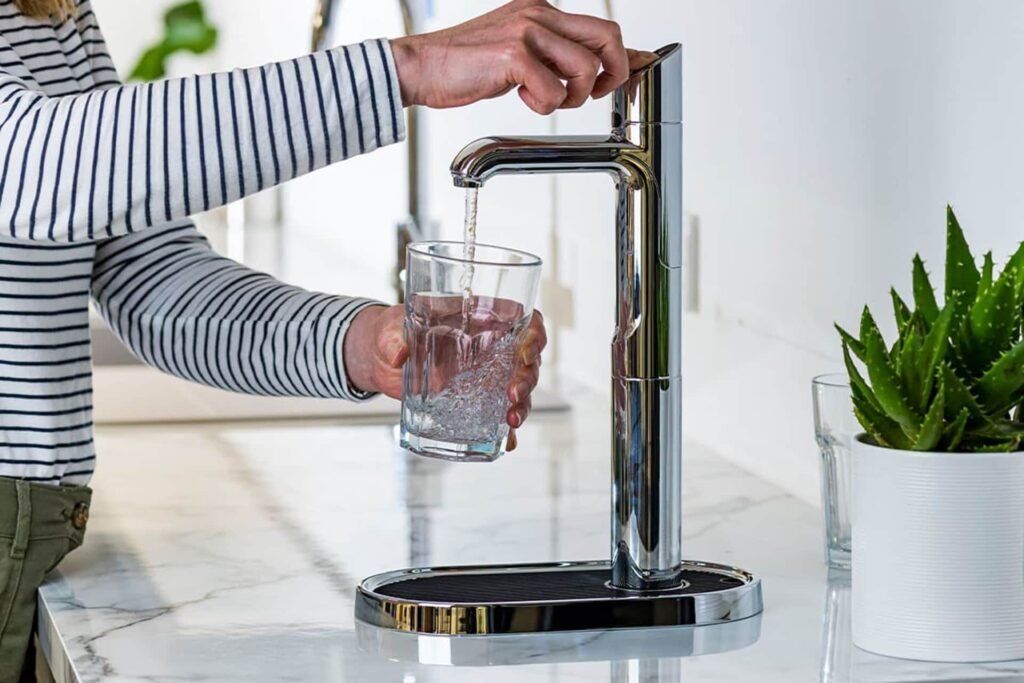Home Water Filtration Systems in UAE & Saudi Arabia
A home water filtration system cleans tap water by removing contaminants such as chlorine, sediments, heavy metals, and microbes. This improves safety, taste, and clarity.
In the UAE and Saudi Arabia, where desalinated water is common, filtration systems are essential to remove chlorine taste, dust, and high mineral content. Systems are available as point-of-use filters (under-sink, countertop, faucet) or whole-house filters.
Types of Home Water Filtration Systems
- Pitcher & Refrigerator Filters – Affordable, carbon-based; remove chlorine and improve taste. Not designed for bacteria or viruses.
- Faucet-Mounted Filters – Easy to install; reduce lead, VOCs, and odors.
- Activated Carbon Filters – Trap chlorine, pesticides, and PFAS; ideal for improving taste and smell in UAE/KSA.
- Reverse Osmosis (RO) Systems – Remove 99% of salts, fluoride, and bacteria; perfect for desalinated water but may waste some water.
- Ion Exchange Filters – Replace harmful ions; effective for hard water in Saudi regions.
- Distillation Systems – Use heat to remove germs and minerals; energy-intensive.
- Nano/Ultra/Microfiltration – Nano blocks viruses; ultra removes bacteria; micro targets parasites. Often paired with UV purification in UAE.
- Whole-House Filters (Point-of-Entry) – Treat water at the inlet for chlorine, iron, PFAS, sediment, or pH balance.
- Sediment Filters – Capture rust, sand, and dust; usually used as pre-filters.
Benefits of Home Water Filters in the Gulf
- Better Taste: Remove chlorine (“tamar water”) from desalinated supplies.
- Dust & Sand Removal: Protects against common issues in Gulf water systems.
- Appliance Protection: Softeners and whole-house filters reduce scale from hard water.
- Health Protection: RO and UV filters remove microbes, metals, and PFAS.
- Family Safety: UV + RO combinations are ideal for children, elderly, and hygiene-sensitive households.
How to Choose the Right System
- Test Your Water – Check chlorine, hardness, and contaminants via lab testing or utility reports.
- Define Your Needs – Taste only? Choose carbon. Full purification? Choose RO + UV. Whole-home protection? Choose a whole-house system.
- Check Certifications – Look for NSF, WQA, or equivalent approvals.
- Consider Maintenance & Cost – Pitchers need monthly changes, countertop every few months, whole-house annually.
- Choose Reliable Brands – Ensure local support and service in UAE and Saudi Arabia.
At-a-Glance Comparison
| Filter Type | Removes/Improves | Best For |
|---|---|---|
| Activated Carbon | Chlorine, taste, odor, pesticides | Budget-friendly, kitchen water |
| Reverse Osmosis | Salts, fluoride, heavy metals, PFAS | High-purity drinking water |
| UV Purifier | Bacteria, viruses | Extra microbial protection |
| Sediment Filter | Rust, sand, dust | Pre-filter, appliance protection |
| Point-of-Use | Targeted treatment | Drinking/cooking water only |
| Whole-House | Chlorine, hardness, PFAS | Entire-home protection, plumbing safety |
Quick Tips
- Always start with water testing.
- Match filter to your water profile.
- Pick certified, high-quality systems.
- Budget for ongoing filter replacements.
- Choose brands with local UAE & KSA support.
Key Terms
home water filtration UAE, KSA water filter systems, desalinated water filtration, whole-house water filter Saudi Arabia, best water filter Dubai, RO system Riyadh
Key Descriptions
“Find the best home water filtration systems in UAE & Saudi Arabia. Compare RO, UV, carbon, and whole-house filters. Learn benefits, how to test water, and choose the right system for local needs.”
Frequently Asked Questions (FAQs)
1. Is tap water safe to drink in Dubai and Saudi Arabia?
Yes, tap water meets safety standards, but may carry chlorine taste, high minerals, or dust. Filters improve taste and safety.
2. Which water filter is best for desalinated water?
RO systems remove salts, fluoride, and metals effectively. Pair with UV purifiers for extra protection.
3. Do I need a whole-house water filter?
For drinking water only, point-of-use filters are enough. For hard water, chlorine, or appliance protection, whole-house systems are recommended.
4. How often should I replace filters?
- Pitcher: 1–2 months
- Faucet/countertop: 3–6 months
- RO membrane: 1–2 years (pre-filters every 6–12 months)
- Whole-house: 6–12 months depending on water quality
5. Which certifications matter?
Look for NSF or WQA certifications to ensure contaminant removal.
6. Can water filters reduce limescale?
Yes, ion exchange and whole-house softeners help prevent limescale in pipes and appliances.
7. Are water filters cost-effective in the Gulf?
Yes. They reduce bottled water use, protect appliances, and provide safe drinking water, saving money long-term.
